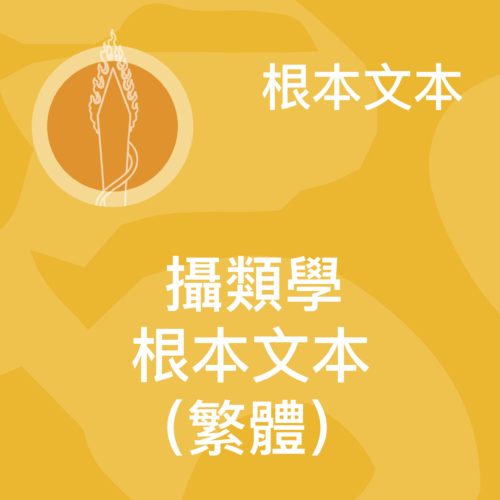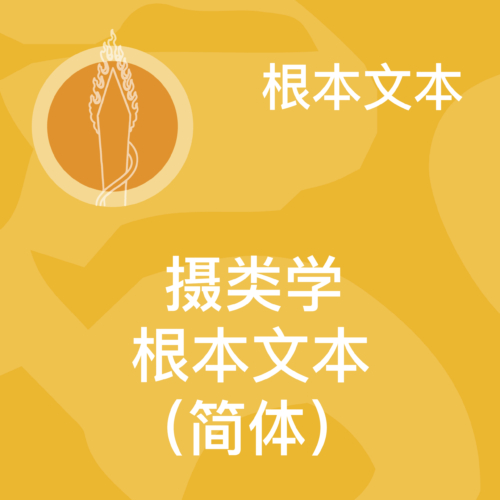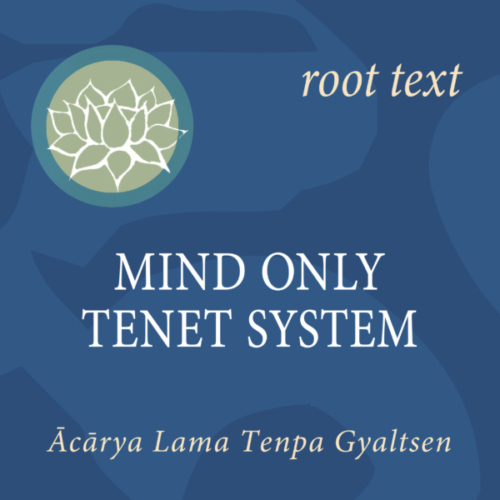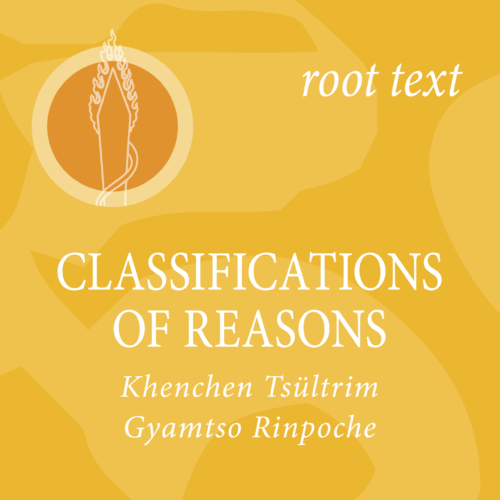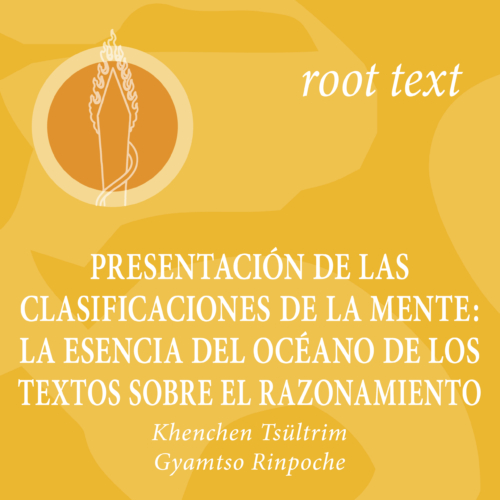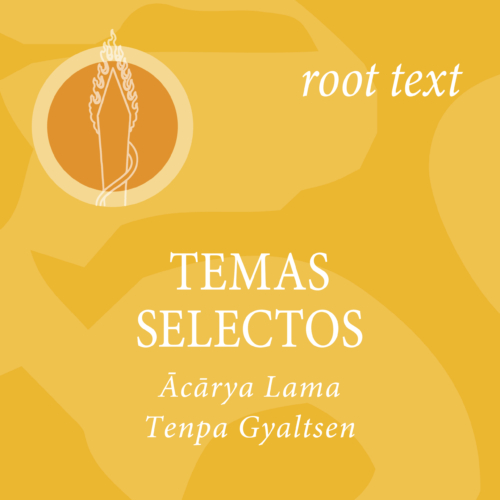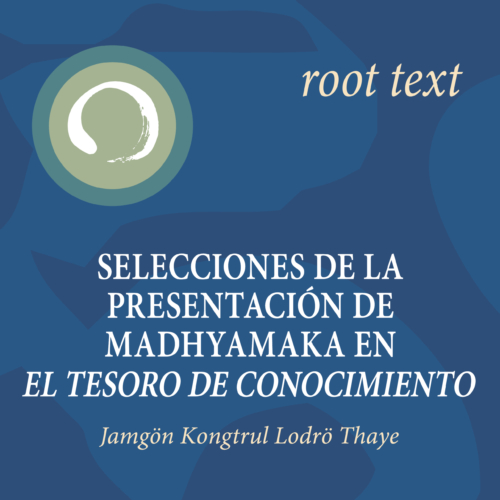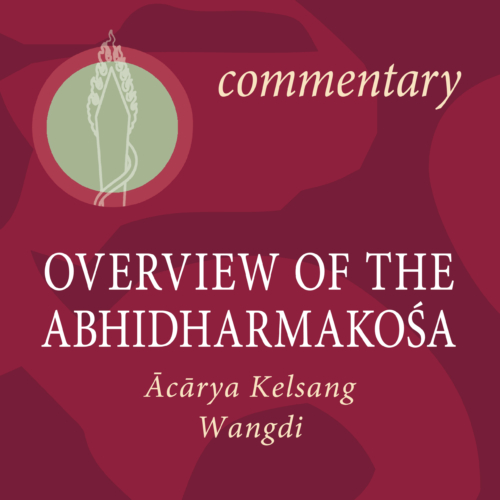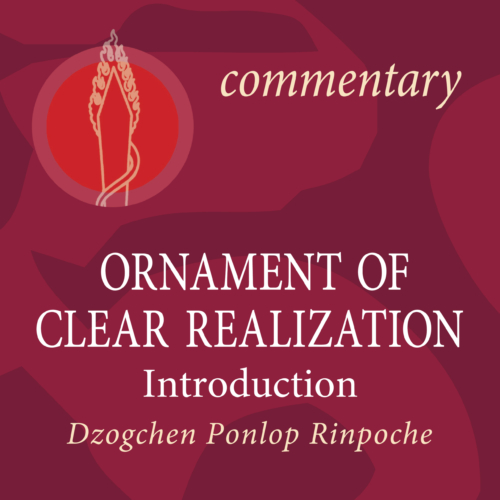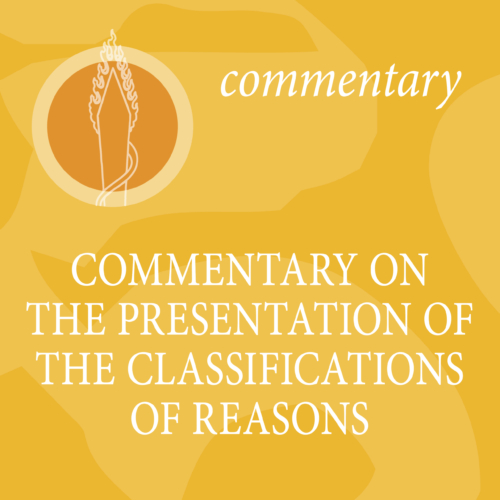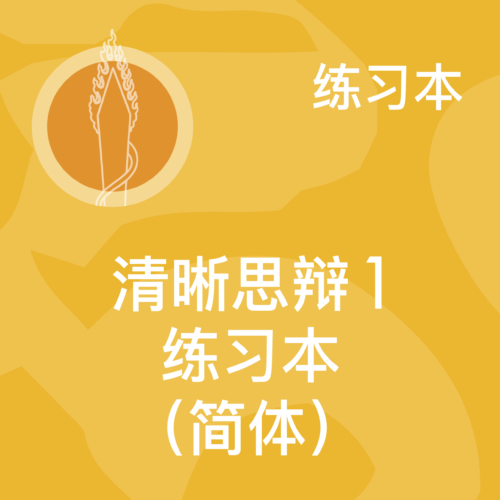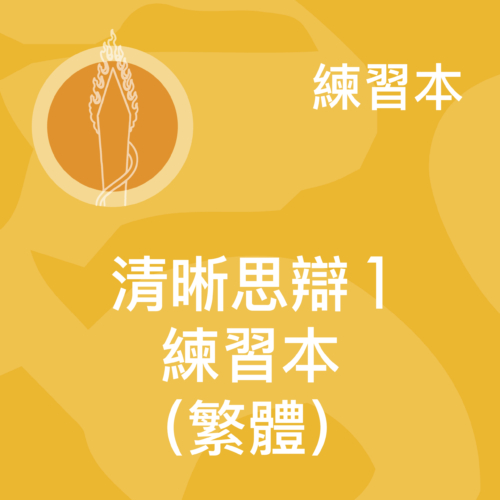-
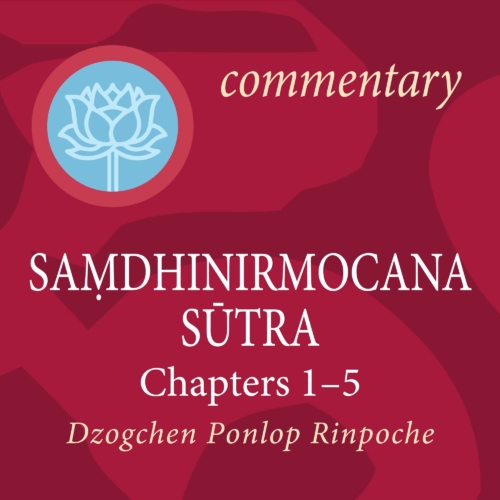
This edition is no longer available.
A New and Updated Edition of this Text Is Now Available Here: https://publications.nitarthainstitute.org/product/2025-commentary-on-the-sa%e1%b9%83dhinirmocana-sutra-chapters-one-through-five-chapter-eight/ -
 El libro aún se está actualizando, pero el borrador está disponible para la compra y uso personal. Para comprarlo, los estudiantes DEBEN aceptar los siguientes términos: POLÍTICA DE CURSOS BORRADOR PROVISIONAL Y ACUERDO DE COMPARTIR ARCHIVOS ELECTRÓNICOS:
El libro aún se está actualizando, pero el borrador está disponible para la compra y uso personal. Para comprarlo, los estudiantes DEBEN aceptar los siguientes términos: POLÍTICA DE CURSOS BORRADOR PROVISIONAL Y ACUERDO DE COMPARTIR ARCHIVOS ELECTRÓNICOS:- El costo del Cuaderno de Trabajo de Pensamiento Claro, Borrador Provisional en formato PDF es de USD $21.95 y no es reembolsable. Este monto servirá como pago de depósito para la compra de la versión final publicada del texto. Se le emitirá un código de cupón de descuento para la compra de la versión final, válido por un año después de la publicación del texto final.
- Nota: El cupón no se puede transferir a otra persona, no se puede usar para comprar otros textos y no es válido para ninguna versión de libro electrónico.
- Usted puede usar el Cuaderno de Trabajo de Pensamiento Claro, Borrador Provisional PDF durante la duración de la clase. Sin embargo, una vez que el curso haya concluido, generalmente determinado por la expiración del acceso a las grabaciones de video y audio del curso, DEBE eliminar el archivo PDF de su computadora, así como eliminar el correo electrónico que contiene el archivo PDF adjunto.
- Si prefiere trabajar con una copia impresa de este texto, puede imprimir una copia para su uso personal y también deberá destruirla después de su uso.
- Al final del curso, enviaremos un recordatorio por correo electrónico. En ese momento, se le pedirá que confirme respondiendo al correo electrónico, indicando que el archivo PDF y la copia impresa han sido eliminados. O, también puede informarnos proactivamente que han sido eliminados enviando un correo electrónico a: publications@nitarthainstitute.org
- Si prefiere no comprar la versión final del texto, todavía está obligado a eliminar/destruir el Cuaderno de Trabajo de Pensamiento Claro, Borrador Provisional, y no se emitirá un reembolso por el pago del depósito que realizó para acceder al Cuaderno de Trabajo de Pensamiento Claro, Borrador Provisional.
- Si decide comprar este texto, esto significa plenamente que ha comprendido y acepta esta política.
- Una vez que recibamos su pedido en el sitio web, enviaremos el PDF a la dirección de correo electrónico indicada en el pedido del sitio web. Utilice el mismo correo electrónico que utilizó para registrarse en el curso de Nitartha. Por favor, permita 72 horas para el procesamiento.
- El costo del Cuaderno de Trabajo de Pensamiento Claro, Borrador Provisional en formato PDF es de USD $21.95 y no es reembolsable. Este monto servirá como pago de depósito para la compra de la versión final publicada del texto. Se le emitirá un código de cupón de descuento para la compra de la versión final, válido por un año después de la publicación del texto final.
-
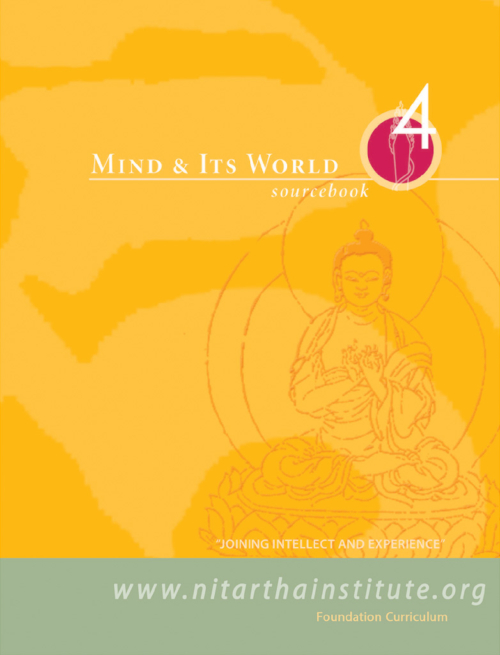
For Self-pace Online Course, students will be using the Mind and Its World IV, Provisional Draft; students must agree with the following policy before placing the order:
PROVISIONAL DRAFT COURSEWARE POLICY & ELECTRONIC FILE SHARING ARRANGEMENT:
- The cost of the Mind and Its World IV, Provisional Draft in the form of a PDF document is USD $23.10 and non-refundable. This amount will serve as a deposit payment towards the purchase of the final published version of the text. A discount coupon code will be issued to you for the purpose of purchasing the final version, valid for one year after the publication of the final text. Note: The coupon cannot be transferred to another person, it cannot be used to purchase other texts, and not valid for any ebook versions.
- You may use the Mind and Its World IV, Provisional Draft PDF for the duration of the class. However, once the course has concluded, usually determined by the expiration of access to the course video and audio recordings, you MUST delete the PDF file from your computer, as well as delete the email containing the PDF file attachment.
- If you prefer to work with a hardcopy of this text, you are welcome to print a copy for your own personal use,and would also need to be destroyed after use.
- At the end of the course, we will send an email reminder. At that time, you will be required to confirm by replying to the email, stating that the PDF file and hard copy have been deleted. Or, you may also proactively inform us that they have been deleted by sending an email to publications@nitarthainstitute.org
- If you prefer to not purchase the final version of the text, you are still required to delete/destroy the Mind and Its World IV, Provisional Draft , and no refund will be issued for deposit payment you made to access the Mind and Its World IV, Provisional Draft .
- If you decide to purchase this text, it fully means you have understood and agree with this policy.
- Once we receive your website order, we will email the PDF to your email address indicated in the website order. Please use the same email as the one you used for registration to Nitartha course. Please be allow 72 hours for processing.
For questions, please email us at publications@nitarthainstitute.org
Mind and Its World IV examines the two Hinayana philosophical tenet systems: the Vaibhashika and Sautrantika schools. Specific topics include the definitions of the two schools, a discussion of their subschools, an in-depth examination of their presentations of the process of perception and objects of knowledge. Also included is a description of the paths and fruition. Selected readings, analytical meditations, study questions, and review summaries are included in the sourcebook. -
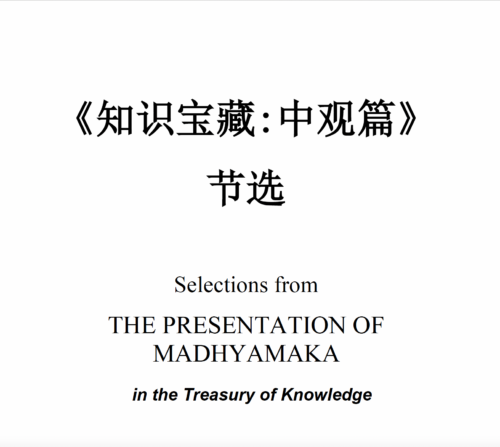
蒋贡康楚罗卓泰耶著
by Jamgön Kongtrül Lodrö Thayé
Selections from The Presentation of Madhyamaka in the Treasury of Knowledge
英译者:Karl Brunnhölzl © 2002, 2019, 2021 了义学院 & Karl Brunnhölzl
中译者:江長华 林霄 © 2023 了义学院
English translation by Karl Brunnhölzl © 2002, 2019, 2021 by Nītārtha Institute and Karl Brunnhölzl.
Chinese Translation by Changhua Chiang & Michelle Lin
-
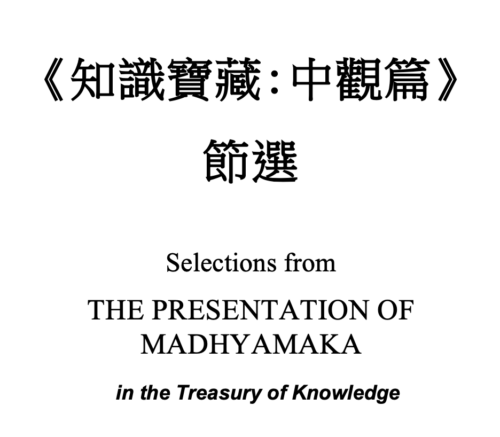
蔣貢康楚羅卓泰耶著
by Jamgön Kongtrül Lodrö Thayé
Selections from The Presentation of Madhyamaka in the Treasury of Knowledge
英譯者:Karl Brunnhölzl © 2002, 2019, 2021 了義學院 & Karl Brunnhölzl
中譯者:江長華 林霄
English translation by Karl Brunnhölzl © 2002, 2019, 2021 by Nītārtha Institute and Karl Brunnhölzl.
Chinese Translation by Changhua Chiang & Michelle Lin
-
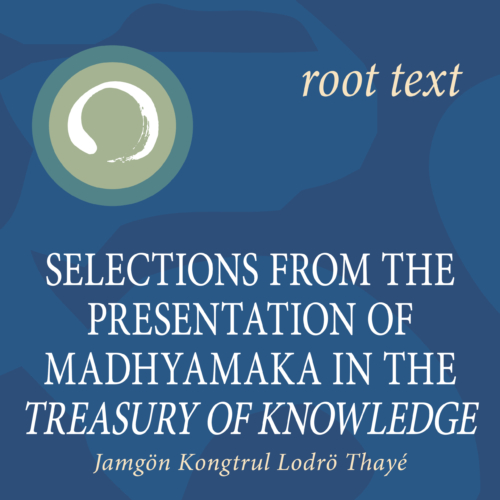
Author: Jamgön Kongtrul Lodrö Thayé Translator: Karl Brunnhölzl
A root text based on sections of Jamgön Kongtrul Lodrö Thaye’s Treasury of Knowledge. It systematically presents the Madhyamaka view of the two truths, the assertions of the subschools of the tradition, and formulates the emptiness reasonings. -
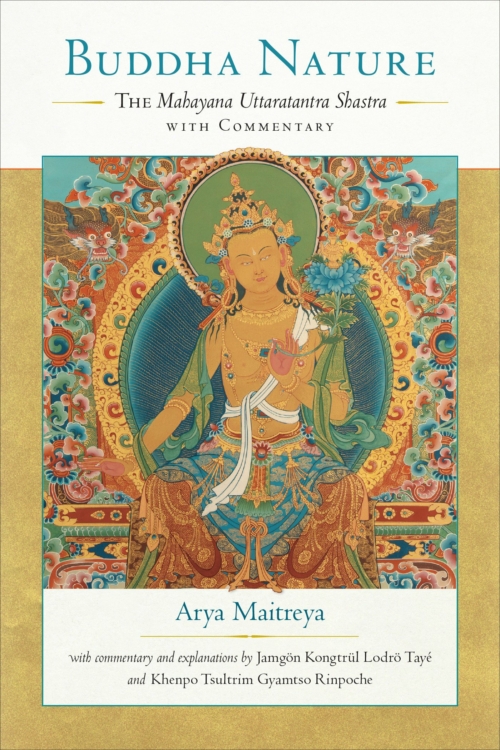
- Also available as an eBook for Apple or Android devices.
- The hardcopy book is shipped from the US. International customers may wish to explore local booksellers or Amazon.com to save on shipping cost.
Buddha Nature: The Mahayana Uttaratantra Shastra with Commentary by Maitreya, Jamgön Kongtrül Lodrö Tayé and Khenpo Tsültrim Gyamtso Rinpoche
Author: Arya Maitreya Commentary: Jamgön Kongtrül Lodrö Tayé and Khenpo Tsültrim Gyamtso Rinpoche Translator: Rosemary Fuchs
All sentient beings, without exception, have buddha nature—the inherent purity and perfection of the mind, untouched by changing mental states. Thus there is neither any reason for conceit nor self-contempt. This is obscured by veils that are removable and do not touch the inherent purity and perfection of the nature of the mind. The Mahayana Uttaratantra Shastra, one of the “Five Treatises” said to have been dictated to Asanga by the Bodhisattva Maitreya, presents the Buddha’s definitive teachings on how we should understand this ground of enlightenment and clarifies the nature and qualities of buddhahood. This seminal text details with great clarity the view that forms the basis for Vajrayana, and especially Mahamudra, practice. -
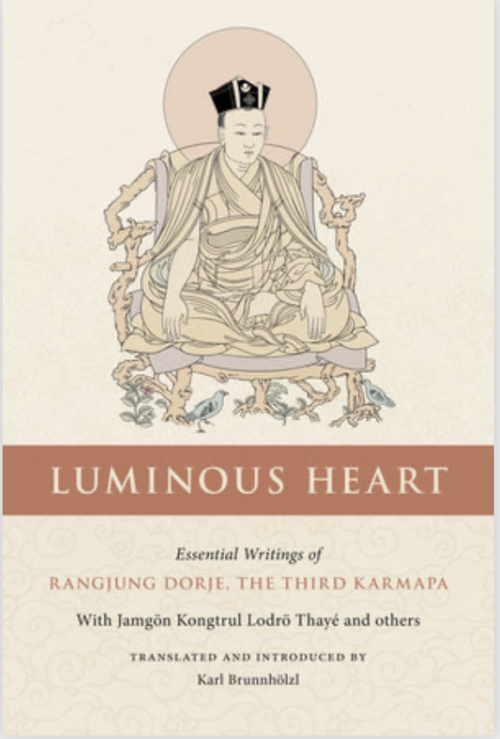
- Available as an eBook for Apple and Android devices.
- The hardcopy book is shipped from the US. International customers may wish to explore local booksellers, Shambala Publications, or Amazon to save on shipping cost.
Translator: Dr. Mitra Karl Brunnhölzl
An extraordinary collection of writings on buddha nature by the Third Karmapa Rangjung Dorje (1284-1339). The Third Karmapa Rangjung Dorje’s unique and balanced view synthesizes Yogācāra Madhyamaka and the classical teachings on buddha nature. His work focuses on the transition from ordinary deluded consciousness to enlightened wisdom, the characteristics of buddhahood, and a buddha’s enlightened activity. Included are commentaries by Jamgön Kongtrul Lodrö Tayé that supplement the view of the Third Karmapa on two fundamental treatises on buddha nature, emphasizing the luminous empty mind of buddha nature as presented by the great Indian masters Maitreya and Asaṅga. For those practicing the sutrayāna and the vajrayāna in the Kagyü tradition, what these texts describe can be transformed into living experience. -
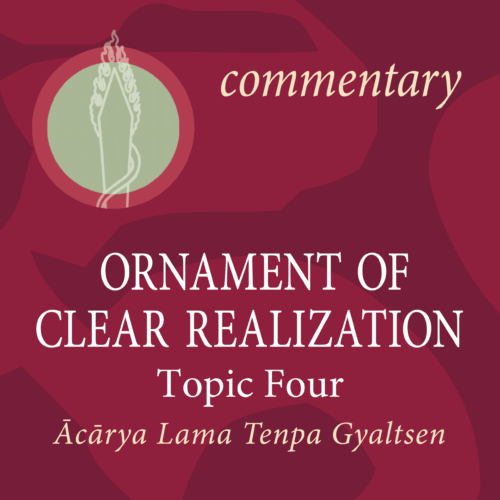
A commentary by Ācārya Lama Tenpa Gyaltsen
This series (Introduction to Topic 8) presents Maitreya’s Ornament of Clear Realization based on the commentary by the eighth Karmapa Mikyö Dorje, Relief of the Noble Ones. Maitreya’s work is the central Mahayana text on the stages of the path and their fruition, for both the Hinayana and Mahayana. It is traditionally summarized in seventy points, or more generally in eight chapters. Whereas the Madhyamaka literature presents the explicit meaning of the Prajnaparamita Sutras, the subject matter of the Abhisamayalamkara is the hidden or implied meaning: the various stages of bodhisattvas, shravakas, and pratyekabuddhas on the path of the meditation on emptiness, from the stage of beginner up through buddhahood. Includes root text by Maitreya and commentary by Mikyö Dorje, translated by Mitra Dr. Karl Brunnhölzl. -
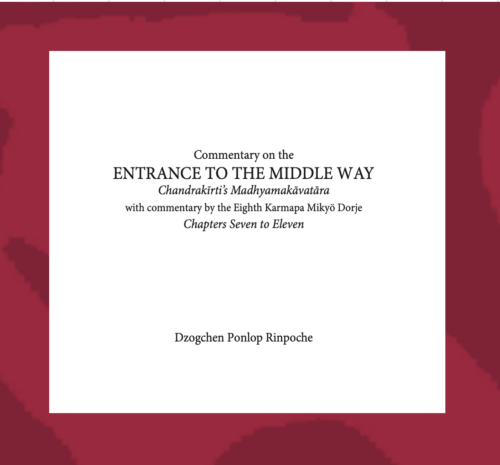
Commentary by Dzogchen Ponlop Rinpoche
This series explicates one of the principal Indian classics of the Madhyamaka tradition, Chandrakirti’s Madhyamakavatara (Entrance to the Middle Way), along with the Kagyü commentary by the eighth Karmapa, The Chariot of the Dakpo Kagyüs. These transcripts cover the Madhyamakavatara’s eleven chapters, which correlate with the ten bhumis (grounds) and the ten paramitas (perfections), plus the ultimate bhumi of buddhahood. The focus is particularly on the sixth chapter of the Madhyamakavatara, which discusses prajna (transcendental knowledge) and its realization of emptiness. Main topics include the selflessness of phenomena and the individual, and the impossibility of finding a self anywhere with the range of phenomenal experience. Includes root text by Chandrakirti and commentary by Mikyö Dorje, translated by Elizabeth M. Callahan. -
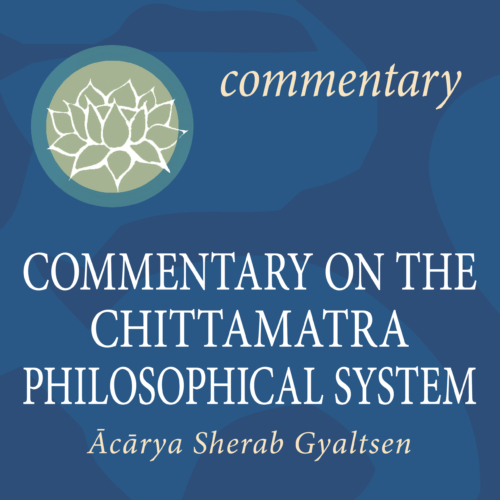
A commentary by Acharya Sherab Gyaltsen
Root verses and commentary on An Exposition Of The Presentation of the Philosophical Systems of the Great Vehicle An Exposition that Reveals the Presentation of the Philosophical Systems of the Chittamatrikas of the Great Vehicle by Dzogchen Ponlop Rinpoche. Translated by Karl Brunnhölzl, Tyler Dewar, and Scott Wellenbach. -
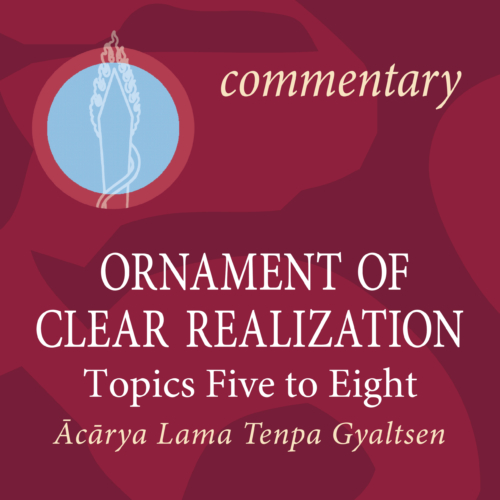
A commentary by Āchārya Lama Tenpa Gyaltsen
This series (Introduction to Topic 8) presents Maitreya’s Ornament of Clear Realization based on the commentary by the eighth Karmapa Mikyö Dorje, Relief of the Noble Ones. Maitreya’s work is the central Mahayana text on the stages of the path and their fruition, for both the Hinayana and Mahayana. It is traditionally summarized in seventy points, or more generally in eight chapters. Whereas the Madhyamaka literature presents the explicit meaning of the Prajnaparamita Sutras, the subject matter of the Abhisamayalamkara is the hidden or implied meaning: the various stages of bodhisattvas, shravakas, and pratyekabuddhas on the path of the meditation on emptiness, from the stage of beginner up through buddhahood. Includes root text by Maitreya and commentary by Mikyö Dorje, translated by Mitra Dr. Karl Brunnhölzl.
